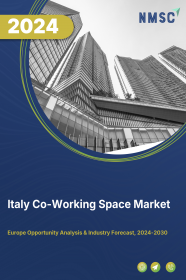
Italy Co-Working Space Market by Space Type (Shared Open Spaces, Enclosed Private Suites, Virtual Office Solutions, and Event or Meeting Facilities), by Membership Type (Hot Desks, Dedicated Desks, and Others), by Business Type (Standard Coworking, and Others), by Business Model (Direct Ownership/Operation, and Others), by End User (Freelancers/Remote Workers, and Others), and by Industry Vertical (Technology & IT Services, and Others) –Opportunity Analysis and Industry Forecast, 2024–2030
Industry: ICT & Media | Publish Date: 04-Nov-2025 | No of Pages: 157 | No. of Tables: 120 | No. of Figures: 65 | Format: PDF | Report Code : IC2024
Industry Overview
The Italy Co-Working Space Market size was valued at USD 308.8 million in 2023, and is predicted to reach USD 997.5 million by 2030, at a CAGR of 18.1% from 2024 to 2030. Coworking spaces present a flexible and versatile solution to meet the changing demands of businesses. These shared work environments offer flexibility in leasing terms and space requirements, which is particularly attractive to startups and small enterprises aiming to avoid the initial expenses associated with traditional offices.
The communal atmosphere promotes networking and collaboration among professionals from various backgrounds, fostering innovation and creativity. With modern amenities and strategic locations, coworking spaces offer cost-effective, scalable, and accessible options for companies seeking a central presence without committing to long-term leases. The industry has witnessed significant growth as businesses acknowledge the advantages of this approach, embracing the collaborative opportunities and shared resources offered by managed workspaces.
Growing Corporate Demand for Scalable, Hybrid-Compatible Workspaces
Italy’s large and mid-sized enterprises are increasingly integrating coworking spaces into their real estate strategies as part of their transition to hybrid and flexible work arrangements. Companies in sectors such as finance, manufacturing, and professional services are reducing their dependency on long-term office leases in favor of agile space solutions that better align with dynamic workforce needs and decentralized team models.
These organizations are prioritizing coworking setups that offer enterprise-grade IT infrastructure, cybersecurity compliance, dedicated zones for branded teams, and seamless connectivity. The added value of reduced fixed costs, improved space utilization, and opportunities for cross-industry networking has elevated coworking from a tactical option to a long-term strategic asset in Italy’s corporate property portfolios.
Surging Demand from Startups and Digital Freelancers Amid Regional Innovation Growth
Italy’s startup ecosystem has gained momentum following national initiatives like the Piano Nazionale di Ripresa e Resilienza (PNRR) and increased VC activity in tech hubs such as Milan, Turin, and Bologna. As entrepreneurship accelerates, early-stage ventures, freelancers, and remote-first businesses are turning to coworking spaces for access to professional-grade infrastructure without long-term commitments.
These users seek flexible packages, 24/7 access, innovation-centered design, and proximity to funding or mentorship ecosystems. Coworking operators that integrate business support services—like legal advisory, accounting, or investor meetups—are especially favored. The trend is fueling expansion of both premium and mid-market coworking spaces across northern and central Italy, where digital startups are most active.
Zoning Restrictions and Bureaucratic Delays Hamper Expansion in Semi-urban Areas
While coworking thrives in urban hubs such as Milan and Rome, the sector’s geographic expansion remains restricted by Italy’s fragmented zoning regulations and complex municipal approval processes. Coworking models often fall between commercial and office use classifications, creating regulatory ambiguity in permitting processes, particularly in mixed-use or residential-adjacent developments.
Smaller towns and emerging districts, despite having growing demand from mobile workers and SMEs, face delays in workspace rollout due to unclear land use laws, outdated building codes, and insufficient municipal digitization. This not only increases entry barriers for new operators but also limits the ability to decentralize flexible workspaces to support regional economic growth.
University Cities and Innovation Clusters Present Strategic Growth Avenues
Secondary Italian cities with strong academic and R&D presence—such as Pisa, Padua, and Trento—are emerging as fertile grounds for coworking development. These regions host growing communities of researchers, student entrepreneurs, and startup incubators, creating continuous demand for collaborative, tech-enabled work environments.
As universities increasingly promote spin-offs and innovation partnerships, coworking providers have the opportunity to integrate into these ecosystems by offering flexible lab-office formats, ideation spaces, and mentorship-linked membership plans. Local government support for innovation districts and EU-funded regional development programs further enhances the attractiveness of these cities for coworking investment. Early expansion into such markets can ensure first-mover advantage and long-term tenant retention.
Competitive Landscape
The Italy co-working space industry comprises various companies, including IWG plc (Regus/Spaces), WeWork Management LLC, Talent Garden S.p.A., Copernico S.p.A., Impact Hub srl SB, Nana Bianca SRL, Spazio01 SRL, Anticafe, Kilowatt SRL, Toolbox Project SRL, Millepiani srl, BSide Coworking, Wire Coworking, Luogocomune SRL, Coaster Coworking, and others.
Italy Co-Working Space Market Key Segments
By Space Type
-
Shared Open Spaces
-
Enclosed Private Suites
-
Virtual Office Solutions
-
Event or Meeting Facilities
By Membership Type
-
Hot Desks
-
Dedicated Desks
-
Private Office Leases
-
Hybrid Flex Passes
By Business Type
-
Standard Coworking
-
Premium Managed Offices
-
Niche or Specialized Spaces
By Business Model
-
Direct Ownership or Operation
-
Franchise or Partnership
-
Real Estate Collabs
By End User
-
Freelancers / Remote Workers
-
Startups (Less than 10 Employees)
-
SMEs (10–250 Employees)
-
Large Enterprises (More than 250)
By Industry Vertical
-
Technology & IT Services
-
Financial & Professional
-
Healthcare & Life Sciences
-
Manufacturing & Logistics
-
Public Sector & Education
-
Others
Key Players
-
IWG plc (Regus/Spaces)
-
WeWork Management LLC
-
Talent Garden S.p.A.
-
Copernico S.p.A.
-
Impact Hub srl SB
-
Nana Bianca SRL
-
Spazio01 SRL
-
Anticafe
-
Kilowatt SRL
-
Toolbox Project SRL
-
Millepiani srl
-
BSide Coworking
-
Wire Coworking
-
Luogocomune SRL
-
Coaster Coworking
Report Scope And Segmentation
|
Parameters |
Details |
|
Market Size in 2023 |
USD 308.8 Million |
|
Revenue Forecast in 2030 |
USD 997.5 Million |
|
Growth Rate |
CAGR of 18.1% from 2024 to 2030 |
|
Analysis Period |
2023–2030 |
|
Base Year Considered |
2023 |
|
Forecast Period |
2024–2030 |
|
Market Size Estimation |
Million (USD) |
|
Growth Factors |
|
|
Companies Profiled |
20 |
|
Market Share |
Available for 10 companies |
|
Customization Scope |
Free customization (equivalent up to 80 working hours of analysts) after purchase. Addition or alteration to country, regional, and segment scope. |
|
Pricing and Purchase Options |
Avail customized purchase options to meet your exact research needs. |

















 Speak to Our Analyst
Speak to Our Analyst

























